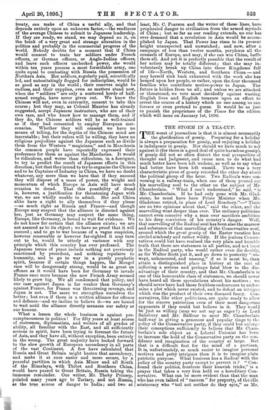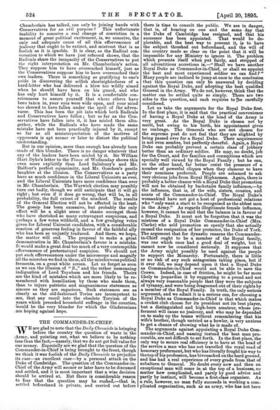THE STORM IN A TEA-CUP. T HE worst of journalism is
that it is almost necessarily the glorification of gossip. Preparing for a holiday is always a preparation for gossip, and enjoying a holiday is indulgence in gossip. Nor should we have much to say against it (for there is a good deal of quite harmless gossip), if gossip did not so often distort the real perspective of thought and judgment, and cause men to do what had much better have been left undone, as well as to say what had better have been left unsaid. There was a very characteristic piece of gossip recorded the other day about the political group of the hour. Two Radicals were con- versing in a railway-train, when one of them poured out his marvelling soul to the other on the subject of Mr. Chamberlain. " What I can't understand," he said, " is Mr. Chamberlain. If he had only gone with Mr. Glad- stone, he must have been Prime Minister when Mr. Gladstone retired, in place of Lord Rosebery."—" There are no two opinions about that," said the other, and the marvelling went deeper than ever. The ordinary politician cannot even conceive why a man ever sacrifices ambition to his deep conviction of his country's danger. Well, that marvelling of the Radical soul has been also the marrow and substance of that marvelling of the Conservative soul, around which the great gossip of the Easter vacation has circled aimlessly and rather wildly. If the jealous Conser- vatives could but have realised the very plain and humble truth that there are statesmen in all parties, and not least in the Radical party, who would rather even die doubly, as Sir Walter Scott put it, and go down to posterity " un- wept, unhonoured, and unsung," if so it must be, than attain a distinguished place in history at the cost of inflicting a serious and perhaps fatal blow to the dis- advantage of their country, and that Mr. Chamberlain is one of this honourable class of statesmen, we should never have heard all these speculations about his motives ; we should never have had these fruitless endeavours to under- mine a plot which never existed, and to defeat an intrigue which was the product of their own diseased fancy. Con- servatives, like other politicians, are quite ready to allow for the sincere patriotism even of their most dangerous opponents if they could but believe in it. They would be just as willing (may we not say as eager ?) as Lord Salisbury and Mr. Balfour to meet Mr. Chamberlain half-way in giving a generous and popular tinge to the policy of the Conservative party, if they could but enlarge their conceptions sufficiently to believe that Mr. Cham- berlain's sole object as a Liberal Unionist has been to increase the hold of the Conservative party on the con- fidence and imagination of the country at large. But that is a difficult feat for the mind of a partisan. It is, unfortunately, so much easier to imagine personal motives and petty intrigues than it is to imagine plain patriotic purpose. What business has a Radical with the policy of the country party except to pervert it ? " Con- found their politics, frustrate their knavish tricks," is a prayer that takes a very firm hold on a hereditary Con- servative. What can be more evident than that'the man who has even talked of " ransom " for property, of the idle aristocracy who "toil not neither do they spin," as Mr. Chamberlain has talked, can only be joining hands with Conservatives for an evil purpose ? This unfortunate inability to conceive a real change of conviction in a moment of great political excitement, is, we conceive, the only and adequate cause of all this effervescence of jealousy that ought to be extinct, and mistrust that is as foolish as it is ignoble. It is clear, as the Radical con- versation to which we have just referred shows, that the Radicals share the incapacity of the Conservatives to put the right interpretation on Mr. Chamberlain's action. They suppose him to have overreached himself, just as the Conservatives suppose him to have overreached their own leaders. There is something so gratifying to one's pride in discovering the selfish shortsightedness of a hard-hitter who has delivered a blow too wildly aimed when he should have been on his guard, and who has only hurt himself by it. It is a comfortable con- sciousness to assure yourself that where others have been taken in, your eyes were wide open, and your mind too shrewd to have fallen under the spell of the adven- turer. This has been the pit into which both Radicals and Conservatives have fallen ; but so far as the Con- servatives have fallen into it, it has misled them alto.. gether, while the Radicals who have made the same mistake have not been practically injured by it, except so far as all misinterpretation of the motives of opponents is apt sooner or later to distort the political understanding.
But in our opinion, more than enough has already been ,made of this blunder. There is no danger whatever that any of the leaders have been misled by it. Sir William Hart Dyke's letter to the Times of Wednesday shows this even more explicitly than Lord Salisbury's and Mr. Balfour's perfect equanimity, and Mr. Goschen's gentle laughter at the illusion. The Conservatives as a party have as much confidence in the Liberal Unionists as ever, and the Liberal Unionists have more confidence than ever in Mr. Chamberlain. The Warwick election may possibly turn out badly, though we still anticipate that it will go right ; but even if it does go wrong, that will be, in all probability, the full extent of the mischief. The results of the General Election will not be affected in the least. The gossip has been excessive, but probably the only effect will be a slight sense of shame amongst those who have cherished so many extravagant suspicions, and 'perhaps a few votes withheld, and a few grudging votes given for Liberal Unionist candidates, with a considerable reaction of generous feeling in favour of the faithful ally who has been so unjustly traduced. And there, we hope, the matter will end. The proposal to make a great demonstration in Mr. Chamberlain's favour is a mistake. it would make a great deal too much of a very contemptible effervescence of preternatural suspicion. We should not put such effervescences under the microscope and magnify all the microbes we find in them, all the mischievous political ferments, on a great white screen. Let us forget as soon as we can the illusion of " Z.," and the rather unmeaning indignation of Lord Teynham and his friends. Theirs are the kind of mistakes which are more likely to be re- membered with humiliation by those who made them, than to injure patriotic and magnanimous statesmen as sincere as they are sagacious. Such statesmen see as clearly as the old-fashioned Tories are incompetent to see, that any recoil into the obsolete Toryism of the years which preceded household suffrage in the counties, would be the very blunder for which the Gladstonians . are hoping against hope.



































 Previous page
Previous page